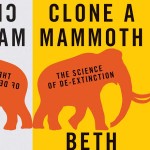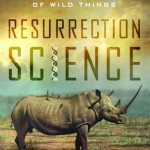I received this book for free from NetGalley in exchange for an honest review. This does not affect my opinion of the book or the content of my review.
 The Worst of Times: How Life on Earth Survived Eighty Million Years of Extinction by Paul B. Wignall
The Worst of Times: How Life on Earth Survived Eighty Million Years of Extinction by Paul B. Wignall Published by Princeton University Press on September 29th 2015
Pages: 240
Format: eARC
Source: NetGalley
Buy on Amazon, B&N
Goodreads
Two hundred and sixty million years ago, life on Earth suffered wave after wave of cataclysmic extinctions, with the worst—the end-Permian extinction—wiping out nearly every species on the planet. The Worst of Times delves into the mystery behind these extinctions and sheds light on the fateful role the primeval supercontinent, known as Pangea, may have played in causing these global catastrophes.Drawing on the latest discoveries as well as his own firsthand experiences conducting field expeditions to remote corners of the world, Paul Wignall reveals what scientists are only now beginning to understand about the most prolonged and calamitous period of environmental crisis in Earth’s history. He describes how a series of unprecedented extinction events swept across the planet in a span of eighty million years, rapidly killing marine and terrestrial life on a scale more devastating than the dinosaur extinctions that would come later. Wignall shows how these extinctions—some of which have only recently been discovered—all coincided with gigantic volcanic eruptions of basalt lavas that occurred when the world’s landmasses were united into a single vast expanse.Unraveling one of the great enigmas of ancient Earth, The Worst of Times also explains how the splitting apart of Pangea into the continents we know today ushered in a new age of vibrant and more resilient life on our planet.
The Worth of Times is a book that looks to be fairly straightforward on the surface, but is actually semi-complex.
Wignall’s novel describes how and why cataclysms caused mass extinctions in pre-historic time. He explains how scientists use technology and ancient clues to solve the riddles surrounding mass extinctions. He mainly describes the role of volcanic activities in mass extinction events. The novel attempts to foster further understanding as to why LIPs (large igneous provinces), which can develop into volcanic provinces, were so detrimental to life before Pangaea broke into smaller land masses.
The Worst of Times is not a book for the uninitiated. Although the description looks to be written for the masses, the content often became bogged down in detail and scientific jargon. I found myself looking up certain Latin named species to understand just what creature Wignall was describing. I also came across words I’d never seen before due to the highly technical nature of the text. Fortunately, Wignall rises above this and attempts to fill the reader in on some of these details.
Prior to reading this title I was unaware of how completely uninformed I was about ancient geology, climate studies and their role in modern science. I had always assumed that studies of extinction level events and climatic shifts were interesting but not at all relevant to today’s world. The Worst of Times completely changed that perception by causing me to understand the interlinked relationship between studying ancient climatic change and developing a deeper understanding of today’s planetary climate system.
Wignall’s attempt to alert readers to our limited understanding of the global climate system comes across as part textbook and part climate debate.
I have read very few articles that convey a positive prognosis for a post global warming world and it is with this background that I found this novel to be refreshing. The author provides plenty of evidence affirming the resiliency of life and the adaptability of Earth’s climatic system which is a welcome change to the mass published panic enabling literature. If Wingall’s research is correct, it could mean we do not understand the long-term effect of global warming or the strength of Earth’s self-correcting abilities. The novel was not enough to change my perception of global warming, but it did offer some interesting food for thought.
I found this title to be dense, often quite difficult to wade through but filled with wisdom. I would not suggest this book if you’re looking for a light, fun read with very simple concepts. I still do not understand half of what I read. I can only say that what looked like a novel akin to a Natural Geographic documentary actually became an academic study of mass extinction agents and climate change effects.
This book would appeal to readers who enjoy science, scientific research, extinction events, ancient history and extremely educational novels. I would recommend readers be prepared for a academic feeling novel as this is not part of the “popular science” trend.
















This one does sound dense, books written by actual scientists rather than science journalists often are I have found, but they can be worth persevering with. Here in Australia, with a lot of heated debate, (no pun intended), about climate change, a new debate has also emerged about science literacy and the need for everyone to kind of lift the game a bit in being informed and critical users of information. Here we currently have a government of climate change deniers who gutted public funding of science and science education amongst other things. I suspect we should all make an effort to be better informed.
At least this book sounds more positive than the one I just finished, which was a great read in that it was accessible science, but it all felt so bleak, despite the author trying to be positive in the last chapter. That one was The Sixth Extinction, well worth the effort but possibly the most depressing thing I have read in the last 12 months.
This book was super dense and half the time I was reading sections over just to understand what was going on. The author did a great job explaining things but I don’t know a whole lot about basic geology or Cambrian-Jurrasic life forms..so I did a lot of research. It took me forever to read this book and I feel like I’ll have to go back to look over some things I still don’t understand but it was worth the read.
I haven’t done much research on climate change in years..plus working in immigration means I read and talked about cultural strife and political struggle rather than climate. Its really great to see people are still working on climate change and developing better understanding. In Canada we seem to be very climate sensitive but we also have the oil sands so people’s opinions are very diverse. I haven’t met many people who think global warming is fixable, though. I definitely agree people should be better educated and informed about climate change and science. I have some friends who know even less than I about scientific matters and I’m extremely under-educated.
I may read Sixth Extinction just to get a more rounded reading experience on the matter. I don’t know how excited I am to read something depressing, but I trust your opinion it’s worth the effort.